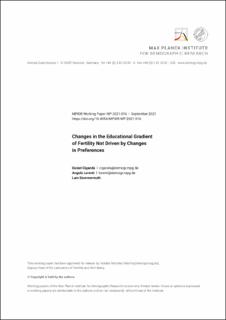| dc.contributor.author | Daniel, Ciganda | |
| dc.contributor.author | Angelo, Lorenti | |
| dc.contributor.author | Dommermuth, Lars | |
| dc.date.accessioned | 2022-03-28T12:55:51Z | |
| dc.date.available | 2022-03-28T12:55:51Z | |
| dc.date.created | 2021-11-12T11:33:01Z | |
| dc.date.issued | 2021 | |
| dc.identifier.citation | MPIDR Working Paper, 2021/16 | en_US |
| dc.identifier.uri | https://hdl.handle.net/11250/2988065 | |
| dc.description.abstract | Fertility levels have historically been negatively correlated with the amount of information and material resources available to individuals and families. The recent reversal
of this trend has been interpreted as a fundamental change in preferences, a return to large families led by more educated individuals. Our analysis shows, however, that the
recently documented changes in fertility can be reproduced in the context of declining family size preferences across educational levels, and without assuming any transformation of the underlying behavioral mechanisms that link resources and fertility across cohorts. We demonstrate this point by replicating the stylized facts reported in previous studies using a simulated dataset. We generate this dataset from a model that assumes continuity in the way education shapes reproductive intentions over time. In our simulated population, the reversal in the relationship between education and fertility emerges as a result of the transition from a natural to a regulated fertility regime, as the share of unplanned births decreases over time, and the mechanisms that positively connect educational attainment with desired fertility become dominant. We conclude, thus, that the explanation for the weakening educational gradient of fertility lies primarily in the decline of unintended fertility, instead of in changes in fertility preferences. | en_US |
| dc.language.iso | eng | en_US |
| dc.publisher | Max Planck Institute for Demographic Research | en_US |
| dc.rights | Navngivelse 4.0 Internasjonal | * |
| dc.rights.uri | http://creativecommons.org/licenses/by/4.0/deed.no | * |
| dc.title | Changes in the Educational Gradient of Fertility Not Driven by Changes in Preferences | en_US |
| dc.type | Working paper | en_US |
| dc.description.version | acceptedVersion | en_US |
| dc.rights.holder | © Copyright is held by the authors. | en_US |
| dc.source.pagenumber | 35 | en_US |
| dc.source.journal | Max Planck Institute for Demographic Research, Working Paper | en_US |
| dc.source.issue | 2021-016 | en_US |
| dc.identifier.doi | 10.4054/MPIDR-WP-2021-016 | |
| dc.identifier.cristin | 1954018 | |
| cristin.ispublished | true | |
| cristin.fulltext | postprint | |

